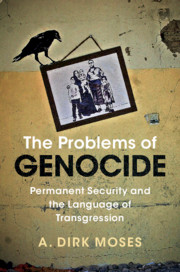Book contents
- The Problems of Genocide
- Human Rights in History
- The Problems of Genocide
- Copyright page
- Contents
- Preface
- Introduction
- Part I The Language of Transgression
- Part II Permanent Security
- 6 Permanent Security in History
- 7 The Nazi Empire as Illiberal Permanent Security
- 8 Human Rights, Population “Transfer,” and the Foundation of the Postwar Order
- 9 Imagining Nation-Security in South Asia and Palestine
- Part III The Language of Transgression, Permanent Security, and Holocaust Memory
- Index
9 - Imagining Nation-Security in South Asia and Palestine
Partition, Population Exchange, and Communal Hostages
from Part II - Permanent Security
Published online by Cambridge University Press: 07 January 2021
- The Problems of Genocide
- Human Rights in History
- The Problems of Genocide
- Copyright page
- Contents
- Preface
- Introduction
- Part I The Language of Transgression
- Part II Permanent Security
- 6 Permanent Security in History
- 7 The Nazi Empire as Illiberal Permanent Security
- 8 Human Rights, Population “Transfer,” and the Foundation of the Postwar Order
- 9 Imagining Nation-Security in South Asia and Palestine
- Part III The Language of Transgression, Permanent Security, and Holocaust Memory
- Index
Summary
South Asian, Palestinian, and Zionist politicians and thinkers also participated in this discourse of national liberation and state-foundation. They too sought to guarantee permanent security for an imagined people by constructing ethnic homogeneity or guaranteeing ethnic dominance over minorities. Permanent security entailed a nation being housed in “its” state; the consonance of the cultural and political nations. In addition to partition and population transfer, another modality of permanent security was “communal hostage taking”: the “occupier” can imagine minorities as potential hostages, objects of possible reprisal for perceived mistreatment of their own nationals likewise “stranded” across the border. These mental operations were necessarily global in projection and meta-reflective in practice, as leaders of states-in-waiting not only studied political dramas in other parts of the world but also scrutinized the lessons that their rivals drew from them. A political history of ideas can show how national security thinking was embedded in practices of analogy making.
- Type
- Chapter
- Information
- The Problems of GenocidePermanent Security and the Language of Transgression, pp. 364 - 392Publisher: Cambridge University PressPrint publication year: 2021

